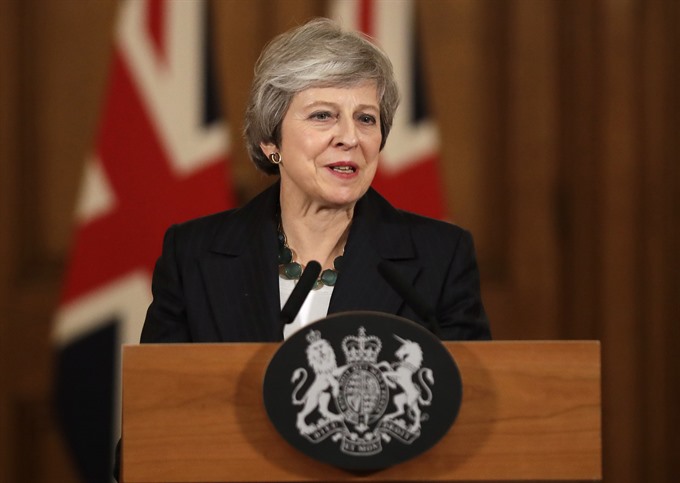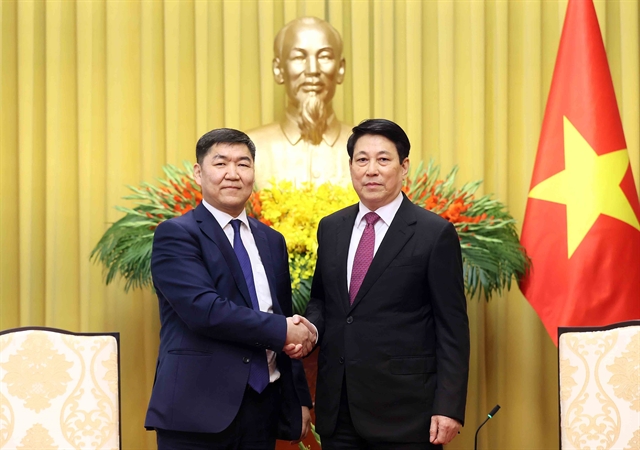 World
World

European governments get their own say on Brexit this week as they debate future ties with London in the run-up to Sunday's summit to sign Britain's divorce papers.
 |
| Britain’s Prime Minister Theresa May speaks during a press conference inside 10 Downing Street in central London on November 15, 2018. She battled against a rebellion over her draft Brexit deal on Thursday, as ministers resigned and members of her own party plotted to oust her. — AFP/VNA Photo |
BRUSSELS — European governments get their own say on Brexit this week as they debate future ties with London in the run-up to Sunday’s summit to sign Britain’s divorce papers.
Ministers from the other 27 EU member states are in Brussels on Monday at the start of what Prime Minister Theresa May calls "an intense week of negotiations."
The British leader has said she will be in the city herself later in the week to meet the head of the EU commission, Jean-Claude Juncker, for last-minute talks.
Neither May nor European leaders are keen to reopen the draft Brexit withdrawal agreement that was grudgingly approved by the British cabinet last week.
But both sides are scrambling to finalise a parallel political declaration that will set out a road-map for post-Brexit negotiations on future EU-UK ties.
"The focus this week will be on the future relationship," May told Sky News.
"We won’t agree the leaving part... until we’ve got what we want in the future relationship, because these two go together."
Specifically, London wants to lay out in as much detail as possible how to get to a free trade agreement before the end of a 21-month post-Brexit transition.
Brussels, meanwhile, insists Britain cannot have the same privileged access to the single market as it did as a member state after Brexit on March 29 next year.
European negotiators plan to publish their version of the statement on future relations on Tuesday, after their ambassadors met over the weekend.
On Sunday, according to diplomatic sources, the document was fleshed out from just over six pages to around 20 as more details were agreed.
They also discussed an EU proposal that the draft withdrawal agreement be amended to extend the post-Brexit transition to the end of 2022.
No decision was taken on this, however, and members are wary of re-opening the document and allowing British hardliners to restart a debate on its terms.
More closed-door talks were to follow on Monday, when the EU 27 ministers of European affairs meet to prepare Sunday’s signing summit.
In the meantime, EU Council president Donald Tusk is going ahead with plans to bring May and her fellow leaders together on November 25 to sign the deal.
"We now have an intense week of negotiations ahead of us," May will tell British business leaders on Monday, according to Downing Street.
"During that time I expect us to hammer out the full and final details of the framework that will underpin our future relationship," she was to say.
"And I am confident that we can strike a deal at the council that I can take back to the House of Commons."
Integrity of the Union
While the EU 27 and their negotiator, Michel Barnier, have remained publicly united through the 17-month negotiation -- Britain’s political camps are at war.
Whether or not May wins an improved future partnership offer this week, she still has to get the withdrawal deal itself past the Westminster parliament.
Hardline Conservative Brexiteers and May’s Northern Irish unionist allies have pledged to vote down the treaty despite the threat of a calamitous no-deal Brexit.
And the opposition Labour Party, scenting a chance to topple May’s government, has also warned that its members will not support her deal.
After making what they regard as an offer that respects Britain’s desire to leave but preserves the integrity of the Union, EU officials are surprised by the furious debate.
Publicly, they refuse to intervene in Britain’s bitter debate, but privately they insist both sides "exhausted their margin to manoeuvre" in the divorce negotiation.
Some member states were annoyed that their rights to fish in British waters were not guaranteed in the withdrawal deal and have been left to future talks.
And Spain also has concerns about the future status of Gibraltar, the British territory on its southern coast, a diplomatic source said.
But thee grumbles remained behind closed doors because, in the words of one European diplomat, the ambassadors agreed "not to pour oil into the British fire". — AFP




